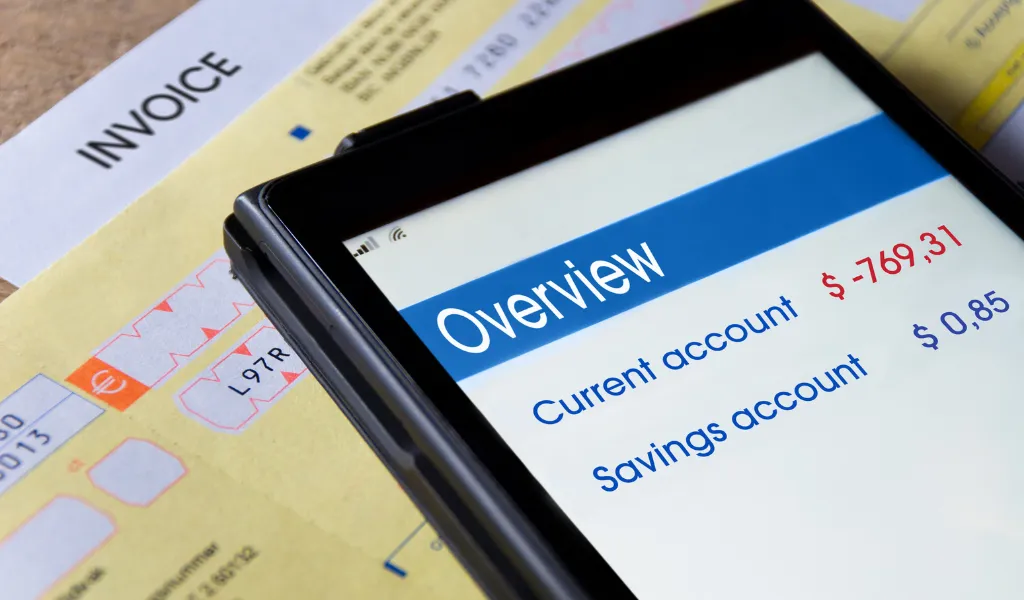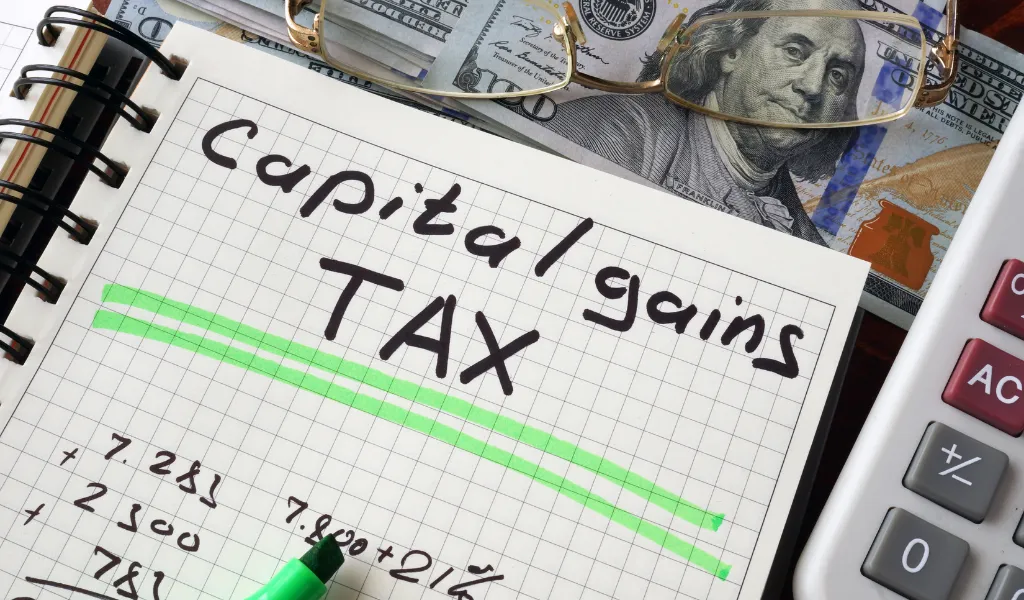There are many forms of borrowing to choose from. The right one depends on your personal financial situation. Overdraft is a form of short-term borrowing where you can spend more than you have in your account. Before you decide to do so, you should know the rules and regulations of an overdraft. You can go to your bank directly to apply for an overdraft. Your bank will charge you interest, which is usually high. Therefore, you should know the ways to control your overdraft. This guide will cover everything you need to know about using an overdraft. It will also answer the question: are overdraft fees tax deductible?
First, let us discuss the definition of an overdraft. Then, we can move on to more complex matters.
What is an Overdraft?
An overdraft allows you to borrow money on short-term basis with your current account. It can come in handy when you are facing unexpected costs or require emergency spending.
Through an overdraft you can spend more than you have in your current account. It is a type of loan, and your bank will charge you interest on it. The interest rates of overdraft are usually high. It is not suitable for long-term borrowing. If you are looking for long-term borrowing, then you should other types of loans.
How Do Overdrafts Work?
You can borrow money from your current account and spend more than you have with an overdraft. If you spend more than you have in your account, the bank will lend you the money. For each day that you do not back this money back, the bank will charge you interest. Suppose your bank balance is £100. Then you decide to buy something worth £150. In this case, you will have a £50 overdraft.
If you are not given an overdraft with your account automatically, you can apply for one. An overdraft is repayable on demand since it is a form of debt. It is crucial to ensure that you have sufficient money in your current account prior to any due payments coming out of your account. Or have an appropriate overdraft limit in place.
Other methods of borrowing money incur less interest than overdrafts as they are a type of loan. For example, personal loans have lower interest rates. To avoid unexpected or expensive fees and high interest rates, you need to find the least expensive way of borrowing. Then, are overdraft fees tax deductible?
What are the Different Types of Overdrafts?
Following are the two kinds of overdrafts you can have with your bank:
Authorised/Arranged Overdrafts
When you set an agreed limit with your bank then it is an authorised or arranged overdraft. Through this you can spend a little more money than you have. Please note that your bank will charge you interest for this arrangement.
Unauthorised/Unarranged Overdrafts
Suppose you spend more money than you have in your account. You do so without an agreement with your bank first. This is when an unauthorised or unarranged overdraft occurs. If you go over your arranged overdraft amount, then this can happen. Or if what you have is insufficient to cover outgoing direct debits. So, are overdraft fees tax deductible?
You can also find specific types of bank accounts with an overdraft built into them. For example, graduate account or student account. They are either free to use or have lower fees.

How Much Can You Borrow Through an Overdraft?
Typically, through an overdraft you can gain access to funds up to approximately £2,000. Still, the amount you can borrow mainly depends on the following two factors:
- Your earnings.
- Your credit scores.
When you first apply to open an account, they will set an overdraft limit. Your personal financial situation determines the limit.
It is possible to get a temporary or permanent extension on your overdraft limit later. Banks have the right to reduce or cancel your overdraft.
What is the Cost of an Overdraft?
In April 2020, major alterations took place to the way building societies and banks charge interest on overdrafts. According to the new rules, charging more on an unauthorised overdraft than an authorised overdraft is no longer possible. Also, banks cannot charge additional fees, only a simple annual interest rate.
Interest is applicable at a single annual interest rate (APR) on all overdrafts presently. As a result, you can easily compare overdrafts between different providers and accounts. When selecting a current account, please consider that interest rates can vary substantially.
Usually, banks tend to charge between 19% and 40% APR. However, certain banks can offer you low interest rates. In fact, some offer 0% interest rates on overdrafts. Please note that this only for a specific period and you must meet the criteria. That is why it is important for you to shop around. This is especially true if there is a high possibility that you will end up using your overdraft. Therefore, are overdraft fees tax deductible?
Why Should You Get an Overdraft?
In case you need a short-term solution or are amid an emergency, then an arranged overdraft is a practical option. Nevertheless, you will have to deal with higher interest rates. In comparison to other lending methods, overdraft interest rates are higher. Credit cards and personal loans have lower interest rates. They are a more viable option for those who are not willing to settle for such high rates.
Your personal financial circumstances determine your requirement for a bank overdraft. For those who are using an unarranged overdraft regularly and having to deal with its charges, it is better to apply for an arranged overdraft. You can go to your bank to apply for it. Otherwise, you should find effective methods to budget your money.
How Can You Apply for an Overdraft?
Usually, you can go directly to your bank to apply for an overdraft. Sometimes, you can do it through a mobile banking application. However, you may need to call your bank or go to your local branch otherwise.
Are Overdraft Fees Tax Deductible?
There are plenty of allowable expenses that you can claim to cut down your tax bill. You must include any costs related to hiring a solicitor, an architect, a surveyor, an accountant, or any other professional you need to help you, when calculating your Self-Assessment expenses.
Similarly, costs for professional indemnity insurance premiums are expenses that you can claim. Also, various other bank and insurance costs. Following are the allowable expenses you can claim to reduce the amount of tax you owe:
- Interest on bank and business loans.
- Hire purchase interest.
- Bank, overdraft, and credit card charges.
- Alternative finance payments such as Islamic finance.
- Leasing payments.
Therefore, overdraft fees are tax deductible.
What is an EAR?
If your account remains overdrawn for a year, then you must pay an interest called the equivalent annual rate (EAR).
An EAR has compound interest, which means charging interest on interest. However, it does not involve any additional fees in case of going overdrawn.
The annual percentage rate (APR) represents the cost of credit and includes any additional fees. That is if throughout a year you borrow £1,200. Banks have the option to refer to the APR. They usually advertise a ‘typical APR’ instead of the actual interest rate. The interest rate depends on your credit record. However, it is necessary for them to offer this headline rate to a minimum of 51% potential customers. Thus, are overdraft fees tax deductible?
How to Control Your Bank Overdraft
It is crucial to make sur that your overdraft remains within the arranged limit. If you fail to do so, you will have to pay charges or fees. To control your overdraft, you should do the following:
1. Monitor Your Bank Balance Regularly
If you are trying to avoid the costs of an unarranged overdraft, then you need to observe your bank balance. This is especially necessary if you are low on funds. The simplest method you can use is online banking. Sign up for it if you do not have access to it already. You can also sign up for text notifications. This way you can get alerts when payments are due and avoid unarranged overdraft costs.
2. Examine All Correspondence from Your Bank
Most people do not bother reading letters they receive from their bank. They think it is simply routine correspondence and nothing that requires immediate attention. Yet, you can miss out on an important notice regarding your finances. If you are using online banking, you can find these messages in your inbox online. So, are overdraft fees tax deductible?
3. Use Your Savings Instead of Accumulating Debt
It is understandable that you want to protect your savings. However, you may need to use them if your overdraft goes beyond your control. Before interest starts to accumulate or there is an impact on your credit score, you should repay your overdraft. When setting up a bank account, if you cannot choose between a current account or savings account, you need to consider what your purpose if for using the account.
4. Pay Off Current Debts
In case you have credit card or other debt, you should consider which one has higher interest and charges. It is crucial that you pay the more expensive one off first.
5. Make a Budget Plan
If your expenses are more than your income, then you need a budget plan. It will assist you in visualising your finances so that you can make the needed cuts. For example, excessive living expenses or unused subscriptions. You can pay off your overdraft and be free of debt by drawing up a budget plan.
Can You Switch Banks While in Your Overdraft?
The short answer is yes, you can. Typically, you can switch banks while using your overdraft. You can do so by using the Current Account Switching Service (CASS). Most banks subscribe to this service. Through this, you can transfer your overdraft and any relating debt to your new savings account.
Is it Possible to Get an Overdraft with a Joint Bank Account?
When it comes to joint bank account, usually they work on ‘either-to-sign’ basis. This means that all parties have the right to make decisions and authorise transactions independently.
As a result, anyone can decrease or increase an overdraft with a joint bank account. Furthermore, each individual bears the responsibility of the overdraft, regardless of whether they ran up the debt.
To cover the debt on your joint account, banks can transfer money from any others accounts you have with them. However, it does not work the other way around. Then, are overdraft fees tax deductible?
Is Using an Overdraft a Bad Idea?
If you do not exceed your overdraft limit, then an arranged overdraft is not going to impact your credit score. Moreover, by using your overdraft reasonably and consistently, you can improve your credit score potentially.
Whereas an unarranged overdraft can affect your credit score. Also, it can have a negative impact on your capability to acquire a mortgage or loan in the future.
Since you are free to borrow as much as you want up to the agreed limit, overdrafts are an immensely flexible form of credit. You can pay back the amount you borrowed without having to face an early repayment fee. However, are overdraft fees tax deductible?
In the long run, they are an extremely expensive method to borrow. This is especially true if you must pay daily or monthly fees along with debit interest. A more suitable option in the long term is an unsecured personal loan.
How to Pay Off Your Overdraft
If you are looking for the most inexpensive way to borrow for the long term, then an overdraft is not the best option. In fact, an unsecured personal loan is better. In case you are finding it difficult to pay off your overdraft, try to do the following:
- Request your bank for an extension to give you some time. Or ask them to waive the fees.
- To check your balance regularly, use mobile and online banking. You should observe your outgoings.
- Modify the payment schedule so that direct debits and standing orders come out of your account on schedule—preferably, just after you get paid.
- Choose a less expensive bank that provides an overdraft with no interest or with lower overdraft fees.
- If your big overdraft is something you cannot afford to pay off right away, switch the loan to a credit card with 0% interest.
- To prevent fees, register for text alerts that will notify you when you are about to reach your overdraft limit.
- If you believe opening a basic account without an overdraft will improve your money management, do so.
Now, you know the answer to the question: are overdraft fees tax deductible?
Conclusion
To conclude, an overdraft is a way to spend more money than you have in your account. Since your bank is lending you money, you need to pay it back. For each day that you do not make the repayment, your bank will charge you money. It is a great way to cover any unexpected costs or if you face an emergency. However, it is not the solution for long-term. It comes with high rates of interest. For lower interest rates, you should consider personal loans. Fortunately, overdraft fee is tax deductible. It is always best to get expert advice before arranging for an overdraft with your bank.








